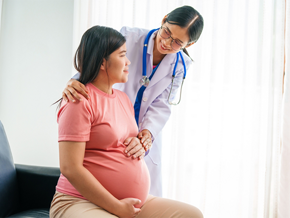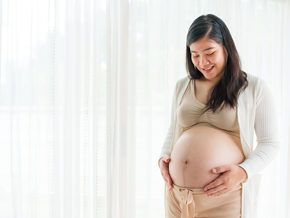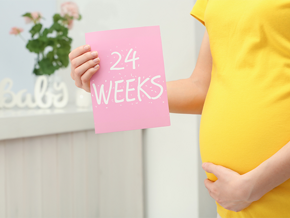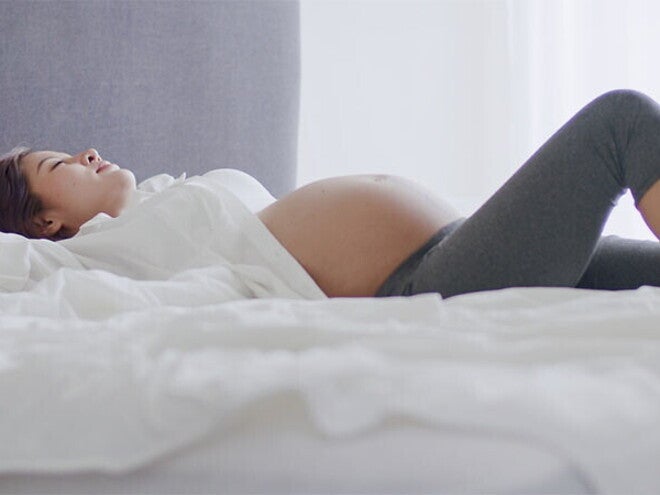
19 Weeks Pregnant? Here's What's Happening to You and Your Baby
If you're 19 weeks pregnant, you’re well into your fifth month, which spans from Week 17 to Week 20. At this stage, you're almost at the halfway point of your pregnancy journey!
From your baby’s key milestones to your growing belly size and new pregnancy symptoms, here's your guide to everything happening in Week 19.
What’s Happening to Your Baby This Week?
Your baby is now about 15 cm (6 in) long, roughly the size of a mango, and their body is becoming more proportional each day. Here’s a closer look at what is going on.
Position and movements
The position of the baby at 19 weeks pregnant changes frequently because there’s still plenty of room to tumble and turn. As their limbs become more proportional, you may feel fluttering sensations or gentle taps. These are your baby's first tiny movements called quickening.
Senses
Your baby’s nerve cells for taste, hearing, sight, and smell are developing in the brain. Their hearing is becoming much more sensitive, which means your voice may now be a familiar sound.
The American College of Obstetricians and Gynecologists (ACOG) notes you can now see your baby’s ears, nose, and lips on an ultrasound scan at this time.
Gender
Doctors typically perform an anatomy scan between 18 and 22 weeks. While the primary goal of this ultrasound is to check on your baby's health, you can also learn about your baby's gender.
A study on the accuracy of ultrasounds performed during the second trimester found them to be 97% accurate in determining fetal gender, provided the baby is in a position that gives the sonographer a clear view.
You may hear about symptoms linked to carrying a boy, like craving salty foods or a low baby bump position, but these are just myths. The only way you can know your baby's gender is through an ultrasound and medical testing.
19 Weeks Pregnant Symptoms
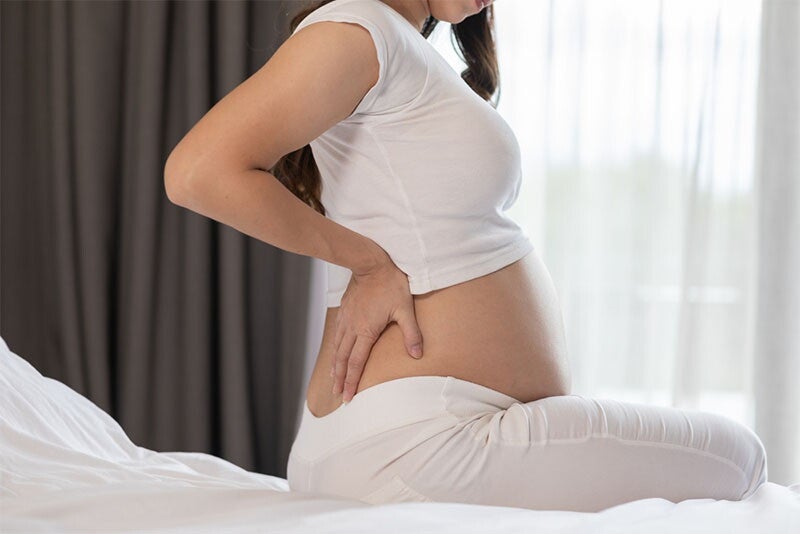
Dizziness, backaches, and round ligament pain are typical at 19 weeks as your body makes room for your growing baby.
Your 19-week pregnant belly size is likely more noticeable now as your uterus continues to expand. Other common symptoms you might feel include:
Aches, pains, and dizziness
Round ligament pain, a sharp sensation in your lower abdomen when you move suddenly, is caused by your ligaments stretching to support your growing uterus. You'll likely notice this pain starting in the second trimester, though it's possible to feel it even earlier.
You may experience occasional dizziness due to changes in your circulation, so remember to stand up slowly. Light spotting can also be typical during this stage. However, it’s still best to contact your doctor if you have any bleeding, just to be safe.
Feeling your baby move
At 19 weeks pregnant, baby movement is a key event, but it’s also normal if you haven’t noticed much yet. According to the American Pregnancy Association, it’s common not to feel much movement until around 18 to 20 weeks if it’s your first pregnancy. But if you’ve been pregnant before, you may recognize the sensations earlier, sometimes as early as 16 weeks.
Limited movement can also be due to an anterior placenta, where the placenta sits at the front of the uterus and cushions the baby’s movements.
Nourishing Your Body for Two
Eat a healthy diet to support your growing baby and keep your energy levels up. Make sure to get the recommended number of calories and nutrients based on the Food and Nutrition Research Institute’s (FNRI) national guidelines.
- Include iron-rich foods like lean meat, poultry, beans, and spinach in your meals to increase blood volume.
- Be sure to get enough calcium and Vitamin D from sources like dairy, leafy greens, and fortified foods for your baby’s developing bones and teeth.
- Focus on eating a variety of high-fiber foods, such as fruits, vegetables, and whole grains, to help manage common pregnancy complaints like constipation.
- Remember to stay well-hydrated by drinking a lot of water.
Your Checklist for a Healthy Week 19
Now is the time to prepare for your mid-pregnancy anatomy scan, where you'll get a detailed look at your baby's development.
Staying organized can help you feel more in control and prepared. Here are a few things to consider this week.
- Sleep on your side: To improve circulation for you and your baby, the Sleep Foundation recommends sleeping on your side. Placing pillows between your knees and behind your back can add extra comfort.
- Wear supportive clothing: As your belly grows, comfortable and supportive clothing can make a huge difference.
- Prepare for your anatomy scan: If you haven’t already, schedule your mid-pregnancy ultrasound to check your baby’s growth and development.
- Involve your partner: Encourage them to talk to your belly, as the baby can hear their voice. They can also join you for the anatomy scan and be a great source of support.
When to Call Your Doctor
While many symptoms are a regular part of pregnancy, there are certain signs you shouldn't ignore. Contact your doctor immediately if you experience any of the following:
- Heavy vaginal bleeding
- Severe abdominal pain or cramping
- A fever or chills
- Painful urination
- Severe dizziness or fainting
Experiencing the changes of a growing belly and feeling your baby's first tiny kicks makes being 19 weeks pregnant a memorable time. Stay informed about your symptoms and your baby's rapid development! This way, you can confidently take care of yourself and make the most of this special time.
If you want to share your experience about the joy of being 19 weeks pregnant, join the ParentTeam Moms and Dads Facebook group and connect with other parents.
References
American College of Obstetricians and Gynecologists. “How Your Fetus Grows During Pregnancy.” Last reviewed January 2024. Accessed June 24, 2025. https://www.acog.org/womens-health/faqs/how-your-fetus-grows-during-pregnancy
Cleveland Clinic. “Quickening in Pregnancy.” Last reviewed April 22, 2022. Accessed June 24, 2025. https://my.clevelandclinic.org/health/symptoms/22829-quickening-in-pregnancy
Johns Hopkins Medicine. n.d. “The Second Trimester.” Accessed June 24, 2025. https://www.hopkinsmedicine.org/health/wellness-and-prevention/the-second-trimester
Kearin, Manette, Karen Pollard, and Ian Garbett. “Accuracy of Sonographic Fetal Gender Determination: Predictions Made by Sonographers During Routine Obstetric Ultrasound Scans.” Australasian Journal of Ultrasound in Medicine17, no. 3 (2014): 125–30. https://doi.org/10.1002/j.2205-0140.2014.tb00028.x
Mayo Clinic Staff. “Fetal Development: The 2nd Trimester.” March 18, 2025. Accessed June 24, 2025. https://www.mayoclinic.org/healthy-lifestyle/pregnancy-week-by-week/in-depth/fetal-development/art-20046151
NHS. n.d. “Week 19 - Your Pregnancy and Baby Guide.” Accessed June 24, 2025. https://www.nhs.uk/start-for-life/pregnancy/week-by-week-guide-to-pregnancy/2nd-trimester/week-19/
The Mother Baby Center. “Trimester Timeline: Calculating Pregnancy Weeks to Months.” January 9, 2023. Accessed June 24, 2025. https://www.themotherbabycenter.org/blog/2023/01/pregnancy-weeks-to-months/

















